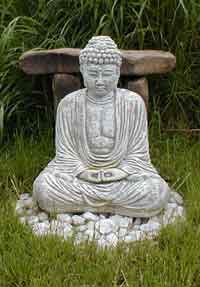
The Benefits of MeditationIn one form or another, meditation has likely been practised throughout the span of human history. Though it is often shrouded in mystery and mistaken for an exotic religious practice, it is really just a means of inducing a focussed state of mind that is as natural to each of us as our breathing. By fostering this state, meditation can bring the practitioner numerous benefits including: mental clarity, reduced stress reactivity, and peace of mind. Also, a regular meditation practice can be central to a more balanced life, greater personal effectiveness, and spiritual growth. So what is so important about this focussed way of being, and if it is so natural, why the need for meditation to take us there? The focussed state of mind that I speak about is actually our most natural way of being. It is a condition in which our mind is calm and centred on our experience of the present moment. It is a condition of unfettered awareness of the internal and external worlds, within which we do what we do automatically, without thought, and often effortlessly. It is not a matter of being "zoned out;" rather, it is being "tuned in." Most of us have had the experience of being lost in some enjoyed activity wherein we feel alive and completely focussed on what we are doing. Athletes and performers sometimes talk about getting “into the zone," the experience of performing their craft effortlessly, with single pointed attention, without thought or distraction. Both such experiences are examples of being in or near this natural state of the "being mind” that meditation helps us attain. As to what happens to draw us from this natural state and how and why meditation helps bring us back to it, it all comes down to our greatest strength and liability: thinking. Lost in Thought: Thinking appears to be a uniquely human ability. By thinking, I mean the ability to internally generate coherent strings of words that form meaningful patterns. When combined with interacting images and emotions we have the incredibly complex world of our active or "doing mind”. With this, our species has developed technologies and cultures, and has built and destroyed civilizations. On the other hand, by virtue of this same ability we have largely become disconnected from our true inner selves, our essential natures. One of the culprits is simply the seductive complexity of the world today; the everyday events of modern life tend to capture our attention and consume most of our energies. Our doing minds tend to run amok with needless activity, and because observing our own thoughts and reacting to them can be so stimulating, we can literally become lost in them. It is important to realize that our thoughts are not who and what we are; they are just highly complex sequences of conditioned cognitive behaviours. Our true self is something very different and exists without words. In becoming lost in thought, we become detached from our true, deeper selves and from the reality of the present moment. When that happens, we become dissociated from our most deeply satisfying experiences, and lose touch with our inner intelligence. This state of dissociation is thought by many to be at the heart of most of the suffering we experience in this life. Meditation allows us to re-experience the true self and the real world, if but for a brief time. By entering the boundaries of this awareness, our perceptions begin to change and we can then start to see ourselves and the world as they truly are. At first, these glimpses are usually brief but most practitioners carry a calmness away with them after a meditation. Unfortunately, the doing mind quickly takes over and before long they are whisked away into the chaos of mental activity. The more we practice; however, the better we become at detaching from the doing mind and this sense of equanimity is more easily attained and longer lasting. Regular practice is a way of re-training ourselves to remembering how to be fully present in the moment and in touch with our inner selves and this leads to the longer term benefits of meditation practice. Clarity of Thought: Try this exercise: Take a
few moments and allow yourself to become aware of your train of
thought. Follow the flow and see where it leads. It may be that
in reading this just now you have created enough focus that your
thoughts have a degree of clarity. Unless we are unusually focussed
in the moment, however, most of us find that the mind, when left
to itself like this, jumps from one thought and image to another
and generally wanders about without direction. This is the normal state of the modern mind. Thinking is a critical task that we engage in every day, but trying to think with true clarity for many of us is like trying to tune in a faint station on an old radio with a bad tuner: we hear static and a clamourous mixture of signals and then a brief moment of the desired station, followed by more discord. With effort we can tune in the station but it will tend to fade in and out with the background noise. Meditation is a means of training the mind to tune out the noise and obtain clarity of thought and experience. When we have such clarity, our thinking becomes more effective and efficient (hence we need less of it), and the same intuition that makes itself known in rare flashes of insight and prescience, becomes more freely available. Getting Real: Much of the dissatisfaction we experience in life, comes from failing to completely experience it. It is as though we wander through life absentmindedly, not noticing what is around us because we are off into the future of past or simply lost in the distortions and illusions of our own thoughts. This is sometimes referred to as being caught up in the doing mind. The essence of meditation, regardless of method, is being present in the moment. This is sometimes referred to as sitting in the being mind. Rather than living by the illusion of our thoughts, by dwelling on the past, fretting about the future, we learn to sit in the reality of the present. This is true freedom and grace. Personal Growth: Meditation also has many benefits similar to therapy in that it engenders self-awareness, can restructure and revitalize the personality, and can enable an ongoing detachment from the stressors of modern living. Many of our thoughts are quite unhealthy and self-defeating; this is the whole focus of cognitive therapy in psychology. When we learn to detach from our thoughts, their true nature comes into proper perspective and then we are not as vulnerable to their effects. Final Words: Meditation offers a legion of benefits and holds incredible promise as a core integral life-practice. Like most self-maintenance skills, though, the greatest benefits come from consistent and gentle practice. Daily practice, even if only for a few minutes, will benefit you more than an extended meditation retreat in the Himalayas. There are many forms of meditation and it’s fine to explore a few at first, but it is very important to pick one form that works for you and stick with it for a time. Take care not to dabble too much at first less you get caught up in the doing mind’s thirst for stimulation and sabotage your progress. Happy meditations!
Copyright © 2003, G. S. Renfrey To obtain a copy of this article, click on the link below. It will open a PDF version in a new window which can then be saved. You may need to enable pop-ups from this site for this to happen. Download a PDF version of this article |
|
||



